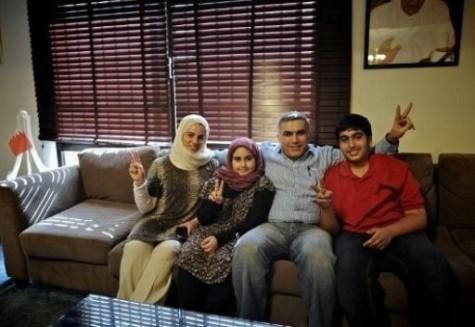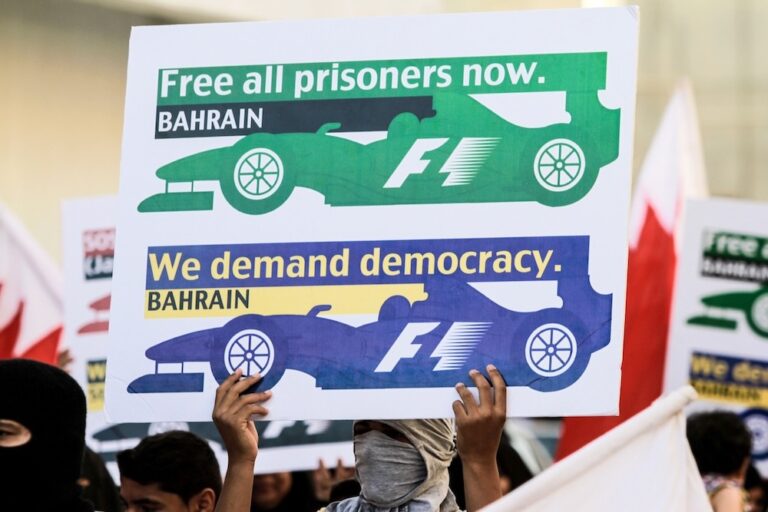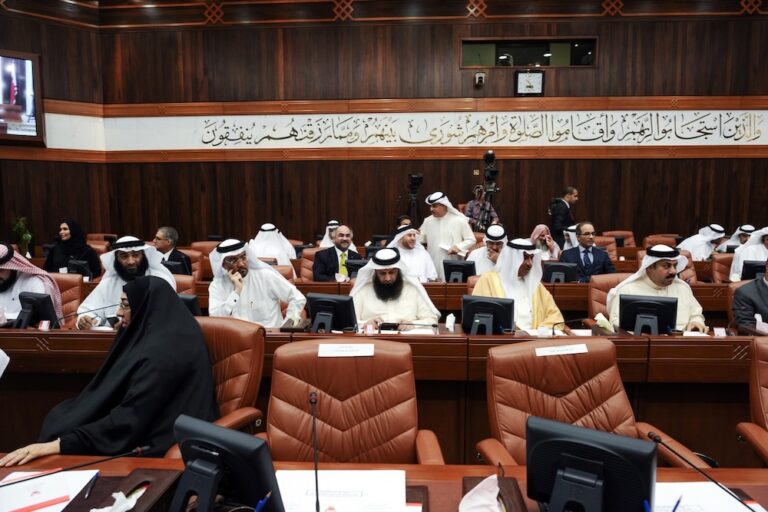Nabeel Rajab's family has documented his poor conditions in a Bahraini prison, where he has been abused, refused adequate medical treatment and isolated from other prisoners. His next appeal is on 27 September.
(BCHR/IFEX) – The Gulf Center for Human Rights and Bahrain Center for Human Rights express their grave concern over the information received regarding the ill-treatment of detained human rights defender Nabeel Rajab in prison in Bahrain, as well as the continued exploitation of the judicial system to punish human rights defenders and hinder their peaceful and legitimate human rights work.
Further to the last update published by the GCHR and BCHR about ill-treatment of the imprisoned Human Rights Defender Nabeel Rajab in a Bahraini prison by putting him in solitary confinement, GCHR and BCHR have received additional details in that regard.
Sumaya Rajab, wife of human rights defender Nabeel Rajab, stated that she met Nabeel on 4 September 2012 in Jaw Prison for the first time in three weeks.
Sumaya confirmed that Nabeel has been subjected to degrading conditions and ill-treatment through repeated personal inspections, whereby his clothing is removed and he is left with only a small piece of fabric to cover his private areas. He said he was subjected to deliberately humiliating inspections.
With regards to being put in solitary confinement in August, Nabeel told Sumaya that he was taken to solitary confinement on the day of his sentencing, stating that it indicated a desire for revenge and punishment, and adding that the atmosphere of the cell suggested to him that he would be exposed to “repeated meals of severe torture.”
She continued by saying that in his solitary cell, Nabeel was stripped of all his clothes, forced to wear a small piece of fabric (“a wrapper”) only, then forced to stand and sit 40 times as part of the physical torture he suffered despite the fact that he suffers from a herniated disc in his back, and has requested a special medical belt to help cope with the recurrence of pain. He was hit on the back by security forces several times in the past.
Sumaya said that Nabeel does not know how many days he has spent in that cell, because he could not tell day from night. In addition to the cell being generally dirty, Nabeel reported that there was also a dead cat in the cell.
Sumaya confirmed that Nabeel doesn’t eat the food he is given by the prison guards because he does not trust them, so he has lived for nearly two months on what is left of his corn flakes cereal and some canned food, as he’s allowed to buy from the prison cafeteria only once a week. Also, he’s allowed to only take 6 liters of water per week, although he suffers from kidney and gallbladder stones.
Sumaya confirmed that in spite of all this suffering, Nabeel’s psychological state is very strong and that he always raises the victory sign.
Sumaya said that Nabeel is still isolated from the rest of the political prisoners and prisoners of conscience, languishing in a common cell with 3 or 4 criminal prisoners, and he’s not allowed to see anyone who enters the jail.
In their treatment of Nabeel Rajab, the authorities in Bahrain are actively violating several articles and conventions, including the Universal Declaration of Human Rights and The Convention against torture. Article 5 of the UDHR reads: “No one shall be subjected to torture or to cruel, inhuman or degrading treatment or punishment”.
GCHR and BCHR consider the treatment of Nabeel Rajab degrading and therefore in clear violation to several international conventions and treaties.
By not taking enough measures to prevent torture in their territory of its jurisdiction, Bahrain has violated the entire Convention against torture, which they signed and ratified in 1998. The state of Bahrain is furthermore continuously ignoring the UN “Standard Minimum Rules for the Treatment of Prisoners”, which since its creation in 1955, sets out the minimum standards regarding for example clothing, hygiene, food, inspections and medical services for prisoners, which creates very severe consequences for prisoners like Nabeel Rajab and Zainab Alkhawaja.
Rajab’s next appeal date is 27 September 2012 in the three-year sentence for three charges of calling for “illegal gathering.
Read Sumaya Rajab’s full report on her husband’s conditions.



